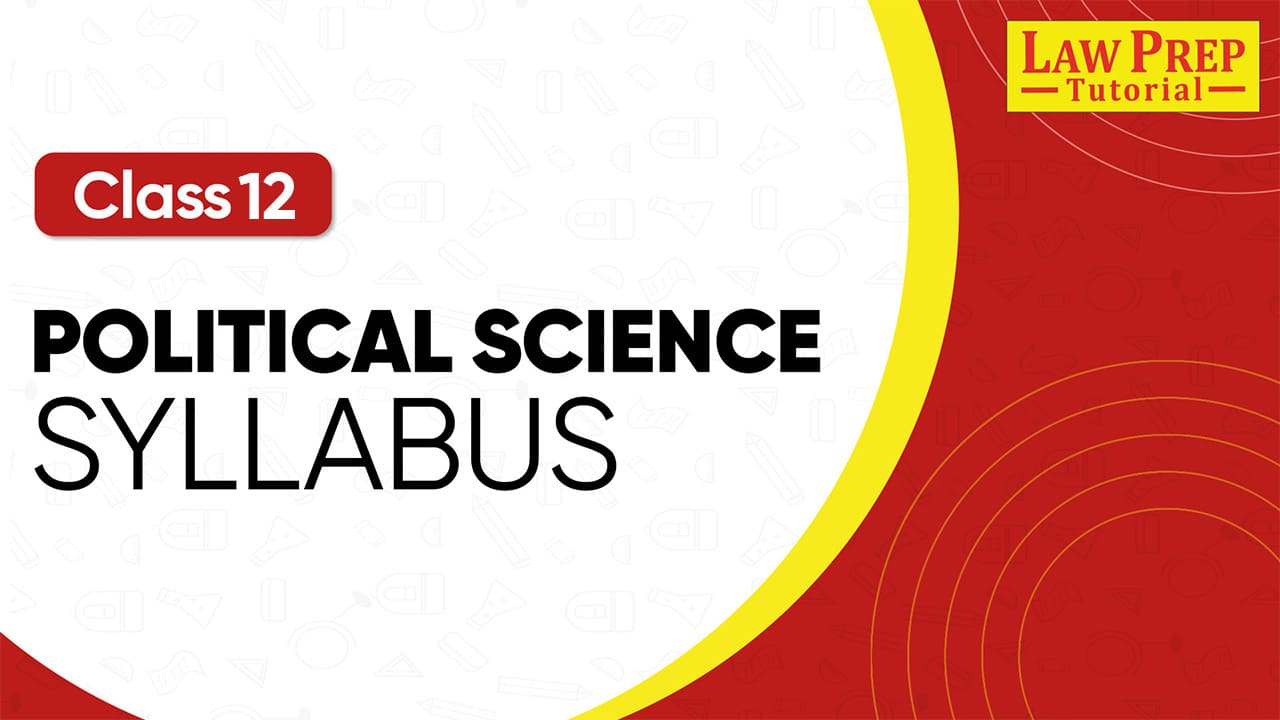Political Science in Class 12 helps you understand the political journey of India since independence and the changing dynamics of world politics. The Class 12th Political Science syllabus 2026-27 prescribed is divided into two major parts – Contemporary World Politics and Politics in India since Independence.
These sections cover India’s foreign policy, global issues like Cold War and globalization, as well as domestic political developments, institutions, and policies.
This subject not only strengthens your analytical understanding of politics but also prepares you for higher studies in Political Science, Law, International Relations, Public Administration, and competitive exams like CUET, CLAT, and UPSC.
Class 12th Political Science Syllabus 2026-27: Overview
Find the highlights of the class 12th syllabus for politicial science:
| Part | Units/Content | Marks |
| Part A – Contemporary World Politics | Cold War Era, The End of Bipolarity, US Hegemony in World Politics, Alternative Centres of Power, Contemporary South Asia, International Organizations, Security in the Contemporary World, Globalization | 40 |
| Part B – Politics in India since Independence | Nation-Building and Its Problems, The Era of One-Party Dominance, Politics of Planned Development, India’s External Relations, Challenges to and Restoration of Congress System, Crisis of the Democratic Order, Rise of Regional Aspirations, Indian Politics: Recent Trends and Development, Democratic Resurgence | 40 |
| Project Work | One project activity | 20 |
| Total | – | 100 |
📥 Download Class 12 Political Science Syllabus PDF
For quick reference and detailed chapter-wise topics, download the official CBSE Class 12 Political Science Syllabus 2026-27 PDF.
Class 12 Political Science Syllabus 2026-27: Part A
Part A – Contemporary World Politics (40 Marks)
This section in the class 12th pol science syllabus explains the key developments in world politics since the end of the Cold War. Students study the disintegration of the USSR, emergence of new power centres, South Asian politics, role of international organizations, global security challenges, environmental concerns, and globalization. It equips learners with knowledge of India’s role in global politics.
| Chapter No. | Chapter Name | Topics to be Focused | Marks |
| 1 | The End of Bipolarity | • Disintegration of the USSR • Transition from Communism • Unipolar world & US dominance | 6 |
| 2 | Contemporary Centres of Power | • European Union • ASEAN• China’s rise • Japan as an economic power | 6 |
| 3 | Contemporary South Asia | • India-Pakistan relations • Conflicts in South Asia • Role of SAARC | 6 |
| 4 | International Organizations | • UN and its reforms • India and the UN • WTO, IMF, World Bank | 6 |
| 5 | Security in the Contemporary World | • Traditional vs non-traditional security • Terrorism, nuclear threats • Environmental & human security | 6 |
| 6 | Environment and Natural Resources | • Global environmental concerns • Rio Summit, Kyoto Protocol • India’s environmental policy | 6 |
| 7 | Globalisation | • Concept and meaning • Impact on sovereignty, culture, economy • India and globalization | 4 |
More Important Resources for CBSE Exam:
| Class 11th Hornbill Syllabus | CBSE Class 11th Commerce Subjects |
| CBSE Full Form | All about CBSE Class 11th |
| Class 11th Syllabus | Class 12th Syllabus |
| Class 11th Commerce Books | CBSE Board: All details |
Class 12th Political Science Syllabus 2026-27: Part B
Part B – Politics in India Since Independence (40 Marks)
This section in the CBSE class XI political science syllabus traces India’s political journey after 1947. It covers the challenges of nation-building, dominance of the Congress system, planned development, foreign policy, political crises, rise of regional aspirations, and recent developments.
It helps students understand democratic processes, political debates, and challenges faced by modern India.
| Chapter No. | Chapter Name | Topics to be Focused | Marks |
| 1 | Challenges of Nation-Building | • Partition and integration of princely states • Reorganisation of states | 6 |
| 2 | Era of One-Party Dominance | • Congress dominance • Opposition parties • Electoral politics (1950s–60s) | 4 |
| 3 | Politics of Planned Development | • Five Year Plans • Green Revolution • Mixed economy model | 2 |
| 4 | India’s External Relations | • Panchsheel • India-USSR relations • India-China war (1962) • India-US relations | 6 |
| 5 | Challenges to and Restoration of the Congress System | • Split in Congress (1969) • Elections of 1971 • Indira Gandhi’s leadership | 4 |
| 6 | The Crisis of Democratic Order | • Emergency of 1975 • Causes and consequences • Politics post-Emergency | 4 |
| 7 | Regional Aspirations | • Punjab, North-East, Kashmir movements • Rise of regional parties • Demands for autonomy | 6 |
| 8 | Recent Developments in Indian Politics | • Coalition politics • Economic reforms (1991) • Changes in party system | 8 |
CBSE Class 12 Political Science Syllabus: Exam Pattern
Marks Distribution
| Part | Marks |
| Part A – Contemporary World Politics | 40 |
| Part B – Politics in India since Independence | 40 |
| Project Work | 20 |
| Total | 100 |
Theory Question Paper Design (80 Marks)
| Typology of Questions | Learning Outcomes | Marks | Weightage % |
| Remembering & Understanding | Recall of facts, terms, concepts; explanation of ideas and processes | 24 | 30% |
| Application | Use of knowledge, facts, and concepts to new situations; interpretation of maps/data | 24 | 30% |
| Analysis, Evaluation & Creativity | Compare, interpret, evaluate political events, issues, institutions | 24 | 30% |
| Map/Diagram/Data Interpretation | Map-based or data-interpretation questions | 8 | 10% |
| Total | – | 80 | 100% |
Project Work (20 Marks)
| Component | Marks |
| Relevance of Topic | 4 |
| Knowledge Content / Research | 6 |
| Presentation Technique | 4 |
| Viva Voce | 6 |
| Total | 20 |
Objectives of CBSE Class 12 Political Science Syllabus
The CBSE Class 12 Political Science syllabus aims to build on the foundation of Class 11 and provide an advanced understanding of Indian politics and world affairs. The main objectives are:
- Understanding Global Politics: To study major developments like the Cold War, US hegemony, regional powers, globalization, and environmental issues.
- Exploring India’s Political Journey: To analyze challenges of nation-building, one-party dominance, planned development, crises, regional aspirations, and recent political trends.
- Developing Democratic Awareness: To understand the functioning of democratic institutions, citizen participation, and India’s constitutional values in practice.
- Enhancing Analytical and Critical Thinking: To evaluate political issues, debates, and ideologies at national and international levels with reasoned judgment.
- Connecting Theory with Practice: To relate political concepts with contemporary case studies, elections, public policies, and governance issues.
- Strengthening Practical Competence: To apply data interpretation, project-based learning, and real-world political analysis in assessments.
- Preparing for Higher Studies and Careers: To build a strong base for careers in law, public administration, international relations, civil services, and competitive exams like CUET, CLAT, and UPSC.
Explore the updated CBSE Class 12 syllabus for all subjects here:
Tips to Prepare for Class 12 Political Science Syllabus 2026-27
1. Read NCERT Books Completely
Stick to the two prescribed NCERT textbooks (Contemporary World Politics and Politics in India Since Independence). Questions are framed directly from these.
2. Make Unit-Wise Notes
Write short notes with headings, bullet points, and timelines. Include landmark events, treaties, amendments, and key leaders.
3. Focus on Case Studies and Examples
Use real examples like India-China relations, Emergency (1975), SAARC, WTO, or global environmental summits to enrich answers.
4. Practice Map Work Regularly
World and India maps are part of the syllabus. Practice identifying regions, alliances, and major events for the 8-mark map component.
5. Revise Key Political Concepts
Be clear on terms like hegemony, globalization, federalism, secularism, and coalition politics. These are often tested in short answers.
6. Solve Previous Year Papers
Work on CBSE past year question papers and sample papers to understand question patterns and time management.
7. Prepare for Project Work Early
Choose a project topic (like elections, foreign policy, or UN reforms) early in the year and keep updating it with data and research.
8. Answer Structurally in Exams
Use a clear structure: Introduction → Explanation → Example → Conclusion. Always add a current or historical reference.
Project Work for CBSE Class 12 Political Science Syllabus
Project work is an important part of the CBSE Political Science Class 12 syllabus carrying 20 marks. It allows students to connect political concepts with real-world events and develop research, presentation, and analytical skills.
- United Nations and Its Reforms – role of India in UN peacekeeping and reform debates.
- Globalization and India – impact of globalization on economy, culture, and politics.
- India’s Foreign Policy – case studies of India’s relations with USA, USSR/Russia, China, or neighboring countries.
- The Cold War Era – analysis of its impact on world politics and India’s non-alignment strategy.
- Emergency of 1975–77 – causes, consequences, and lessons for Indian democracy.
- Coalition Politics in India – rise and impact on governance after 1989.
- Regional Aspirations – movements in Punjab, North-East, or Kashmir and their resolution.
- Global Environmental Issues – Rio Summit, Kyoto Protocol, Paris Agreement, and India’s policies.
- Indian Politics in the 1990s – liberalization, globalization, and changes in the party system.
- Contemporary Security Challenges – terrorism, climate change, cyber security, and India’s responses.
Prescribed Books for Class 12 Political Science Syllabus
- Contemporary World Politics: Class XII, NCERT
- Politics in India Since Independence: Class XII, NCERT
These NCERT textbooks are the only prescribed books for Class 12 Political Science. All theory and project questions are strictly based on these. Students should study them thoroughly, including in-text questions, timelines, maps, and case studies.
Check the latest CBSE Class 11 syllabus for all subjects below:
FAQs About Class 12 Political Science Syllabus
There are 15 chapters in total – 7 in Contemporary World Politics and 8 in Politics in India since Independence.
The NCERT book Contemporary World Politics is prescribed for Part A of the CBSE Political Science Class 12 syllabus.
The NCERT book Politics in India since Independence is prescribed for Part B of the syllabus.
Yes, project work is compulsory. It carries 20 marks and is based on topics like globalization, Indian foreign policy, UN, Emergency, or environmental issues.
Chapters like End of Bipolarity, Globalisation, Challenges of Nation-Building, India’s External Relations, and Recent Developments in Indian Politics are high-weightage.
Yes, map and data interpretation questions carry 8 marks in the theory paper.
Project work is assessed as: Topic relevance (4), Research (6), Presentation (4), and Viva (6).
Yes, NCERT is sufficient. All questions in the CBSE exam are strictly based on the NCERT textbooks
Yes, students can choose from suggested topics like foreign policy, UN reforms, Emergency, coalition politics, or regional aspirations.
Yes, India’s External Relations is a full chapter, covering India’s relations with the US, USSR/Russia, China, and neighbors.
Yes, it helps in CUET, CLAT, UPSC, and other competitive exams by strengthening knowledge of politics, governance, and international relations.
Read the chapter-wise summaries of Class 11 English here:
Find detailed questions and answers from all chapters of English Class 11 now:
Discover CLAT exam resources that can help you get started early:
Explore CLAT coaching centers across different cities:


